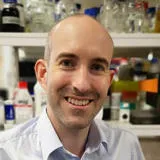In essence we fitted a trigger to the gun. These newly engineered T-cells coined ‘HypoxiCAR Immunotherapy’ are designed to lay dormant within healthy organs and the blood, but when they come into contact with the tumour, they ‘awaken’ and aggressively attack the cancerous cells.
Dr James Arnold, School of Cancer & Pharmaceutical Sciences
05 June 2020
Engineering T-cells to selectively target cancer
Researchers from the Faculty of Life Sciences & Medicine have re-designed the genetic code of cells which can be trained to aggressively attack solid cancerous tissue.

Genetically engineering a cancer patient’s T-cells to ‘train’ them to target cancer cells, known as ‘CAR T-cell immunotherapy’ has resulted in cures for some patients with certain blood cancers, but has proven challenging when fighting solid tumours.
One major issue is that most solid tumours do not have a unique receptor towards which these T-cells can be trained against. As such, it is difficult to get these cells to focus their killing on the tumour alone, as they can also get distracted and activate in healthy organs where their target may also be found. This results in tissue damage and release of inflammatory signals into the blood known as a ‘cytokine storm’ which can lead to potentially lethal toxicities for the patient.
To try and solve this issue, Drs James Arnold and John Maher’s team have been working in collaboration aiming to generate a CAR T-cell which could be engineered to attack specifically in the tumour.
By re-designing the genetic code which is placed into these T-cells, the researchers have engineered these cells to sense and activate in response to a characteristic specific to the solid tumour microenvironment known as ‘hypoxia’, a lack of oxygen, as tumour rarely receive sufficient oxygen supply compared to healthy organs.
The investigators were surprised by how effectively their approach worked, and in their models of cancer, found that these T-cells were able to eradicate the tumour while leaving all healthy organs untouched.
Although there is much work to be done in taking these discoveries to the clinic, these results provide a platform to selectively target the CAR T-cells to attack the tumour. As we appear to be preventing toxicity using this technology, this could have the potential to pave the way far greater numbers of these cancer-fighting cells to be given to patients, allowing us to deliver a vast army of tumour-specific killers, ready to focus their fight on the tumour.
Dr James Arnold, School of Cancer & Pharmaceutical Sciences
The full study can be found deposited at bioRxiv.


